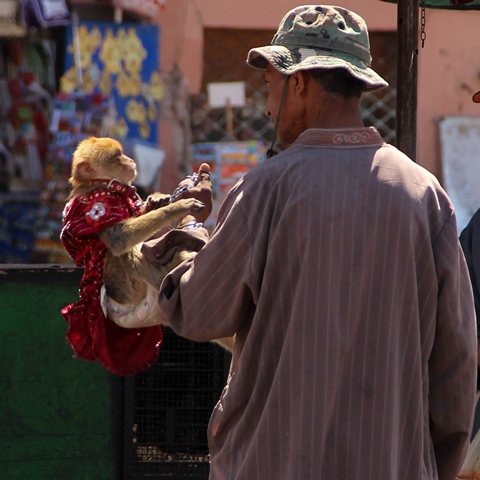Born to be Wild
of the endangered
Barbary Macaque.
Snatched and illegally traded
For years, the requests for shelter for Barbary macaques at AAP had been increasing. Research confirmed the worst: the Barbary macaque is on the verge of extinction. Less than 10,000 Barbary macaques are still living in the wild (Morocco and Algeria), while in 1977 there were about 23,000…
Baby Barbary macaques are snatched from the wild by poachers and then illegally traded. The animals then end up as pets or tourist attractions. In addition, the natural habitat of the Barbary macaque is rapidly being destroyed. High time for action, because the Barbary macaque must not become extinct!
The animals are Born to be Wild.

The problem
The biggest threats to the Barbary macaque are poaching, illegal trade and destruction of its habitat. Research in 2008 was crystal clear about the consequences if nothing was done: the irrevocable extinction of Barbary macaques in the Middle Atlas Mountains. And if this largest population of Barbary macaques in the world disappears, it could mean the demise of the entire primate species within 15 to 20 years.
Poaching and illegal trade
- Hundreds of mostly young Barbary macaques are poached every year.
- By far the most poached Barbary macaques are illegally traded to Europe, where they end up as pets or as ‘photo models’ to be photographed with tourists.
- European seizures show that most animals are smuggled in a suitcase, bag or under a seat. They are then sedated with a sleeping drug. It is unknown how many animals do not survive this, but without a doubt the mortality rate among (baby) Barbary macaques is high.
- The Barbary macaque is the most seized endangered mammal in the European Union and one of the most registered primate species at AAP.
Destruction of habitat
- The last Barbary macaques in the wild live in fragmented areas in northern Algeria and in Morocco. About half of all remaining Barbary macaques live in Ifrane National Park, a national park formed by the forests of the Middle Atlas Mountains in Morocco.
- Habitat destruction is due to climate change, overgrazing, illegal logging and charcoal production.

Born to be Wild
Born to be Wild is an international cooperation programme to secure the survival of the critically endangered Barbary macaque. AAP launched the project in 2017 together with IFAW, supported by the Moroccan government and numerous other organisations. Born to be Wild ambitiously continues the work of the MPC (Moroccan Primate Conservation Foundation), which was founded back in 2003 by former AAP animal carer Els van Lavieren.
After the first project, which focused on the work of the rangers of Ifrane National Park, AAP and the Moroccan ANEF (National Agency for Water and Forests) took the reins in 2021. A second project was started in Tazekka National Park, where the Barbary macaque had died out many years before. Research has shown that this area is still suitable for Barbary macaques to live in. From mid-2022, rescued Barbary macaques will be prepared on-site for life in the wild.
Born to be Wild
Born to be Wild consists of three main components:
Protecting
- Immediately preventing the poaching of young Barbary macaques;
- Discouraging the smuggling to mainland Europe;
- Providing (emergency) shelter for Barbary macaques that are confiscated.
Embedding
- Ensuring the protection of Barbary macaques by the Moroccan authorities and the Moroccan public;
Facilitating monitoring, law enforcement and the criminal prosecution of smuggling and trafficking.
Preserving
- Protecting the habitat of the Barbary macaque and facilitating its recovery;
- Establishing a structure and revenue model to sustainably finance and continue activities in Morocco.
Collaboration
- Moroccan authorities (national, regional and local)
- Spanish authorities (national, regional and local)
- Eurogroup for Animals (Brussels)
- Asociación Nacional para la Defensa de los Animales (ANDA, Spain)
- Lega Anti Vivisezione (LAV, Italy)
- TUI Travel Association (Europe)
- All for Nature (The Netherlands)

The Born to be Wild project in Ifrane National Park would not have been possible without the enormous support from the Dutch National Postcode Lottery participants. The AAP Foundation received over €1.3 million from the Dutch National Postcode Lottery in 2017 to realise this project to protect the Barbary macaque. This support also makes it possible to continue the project in Ifrane NP after 2020. The danger to the Barbary macaque has not yet passed there, which means further building on the results achieved remains necessary.

